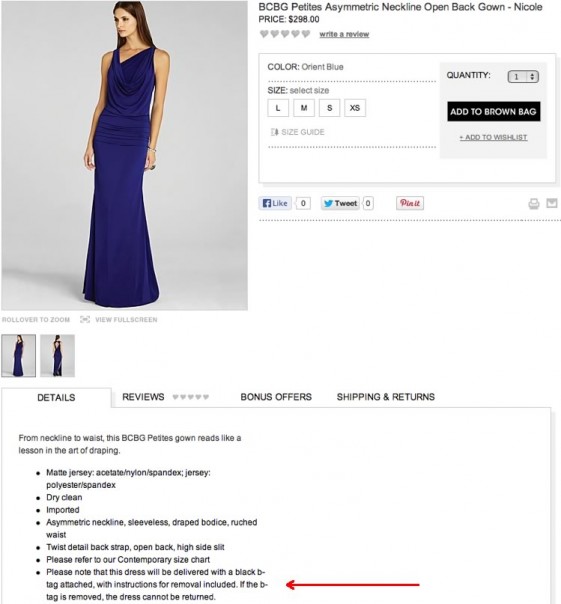We recently presented a look at two different retail return policies in A Tale of Two Returns. The post looked at a very liberal return policy, Macy’s, and a very customer-unfriendly policy at a mall-based cell phone accessory store.
However, this juxtaposition of experiences only scratches the surface of what is involved in retail returns and the delicate balance retailers have to strike between customer-friendly policies and return fraud.
I’m Going to the Bloomingdale’s, and I’m Going to Get Married
In a recent article on Bloomberg.com entitled Bloomingdale’s Black Tags End Party for Next-Day Returns, the authors discussed the lengths to which retail icon Bloomingdale’s is going to combat “wardrobing,” a form of return fraud wherein a customer buys an item of clothing to wear for a single occasion and then returns it.
Bloomingdale’s now places a black tag on the garment in a prominent place; if the tag is removed, the item cannot be returned.
As you can see from the red arrow below, Bloomingdale’s even puts the policy on its web site for this prom dress.
How big is this problem and return fraud in general? The article contained a few interesting statistics:
- Wardrobing was estimated to cost the retail industry 8.8 billion dollars last year
- 65% of retailers reported experiencing wardrobing, up from 61% the year before
- Retailers estimate that 3.3% of total returns last year were fraudulent
While the $8.8 billion dollars is a drop in the bucket spread across the entire retail industry, it should be noted that only 2/3 of the industry is currently reporting experiences with wardrobing, and further, though the article does not state this explicitly, the bulk of the wardrobing problem is most likely concentrated in a much smaller group of higher end retailers.
A billion dollars here, a billion dollars there. Sooner or later we’re talking about real money.
Profitable Customers Are Good Customers
Great customer service means nothing if it does not contribute to the eventual profitability and fiscal health of the organization.
I’ve been further refining the concept of Hero-Class Customer ServiceTM lately for a variety of different projects. One differentiator I recently constructed was the following:
Great customer service creates a happy customer; Hero-Class Customer ServiceTM creates a happy and profitable customer.
Profitability, however, might be one of the most underused words in customer service and customer experience training. In fact, a lot of customer service training holds up unprofitable behaviors to be exemplary behaviors.
If you’ve had much customer service training, then you’ve probably been exposed to some version of the Nordstrom tire story. The story is simple: An man walks into Nordstrom and wants to return his tires. Nordstrom, obviously, does not sell tires and never has; however, Nordstrom had taken over a location from a company that did used to sell tires. According to the story/legend, the sales rep refunded the tires.
True or not, I’ve always had a love/hate relationship with the tire story.
Why?
While the Nordstom tire does a great job of communicating a culture of incredible customer service, the story is anecdotal teaching at its worst. The tire story makes an example of an extreme case of one-off customer service that if scaled would prove disastrous to the company’s fiscal health.
And guess which company agrees that the Nordstrom tire story is not a sound basis for a return policy? Nordstrom.
The customer-service legend has its own approach to the wardrobing problem in its stores, and it does not include taking everything back. According to the Bloomberg article:
“Nordstrom doesn’t use such plastic tags, Colin Johnson, a spokesman for the Seattle-based company, said in an e-mail. On special-occasion dresses, it uses silver-colored paper tags, similar to price tags, that it places high on the side seam of the garment, under the arm. These tags must still be attached for returns, he said.”
Taking back tires? In the real world, Nordstrom is not even taking back it’s own merchandise in some cases.
Finding The Sweet Spot
The article goes on to say that Nordstrom is fairly accepting of one-off situations “while being firmer with repeat offenders.” Nordstrom is looking for that sweet spot, the line between customer service and sound fiscal decision making.
Even the legendary Nordstom understands that accepting returns should not mean accepting abuse.




